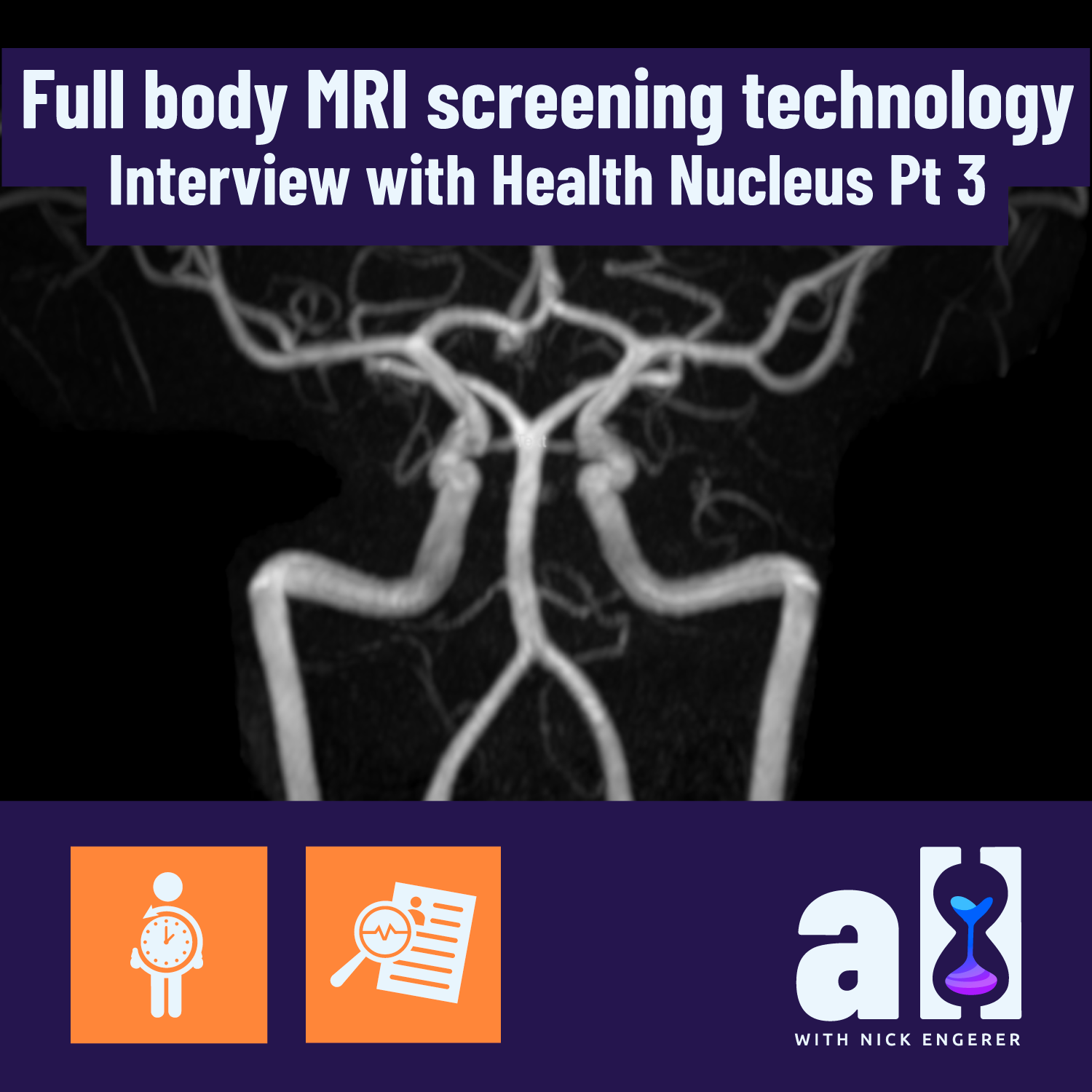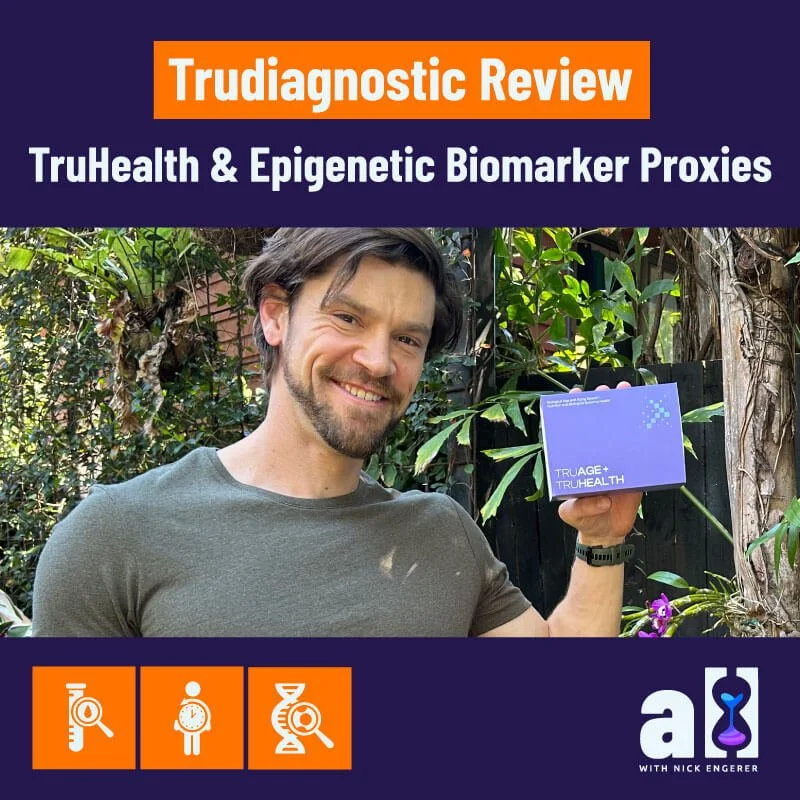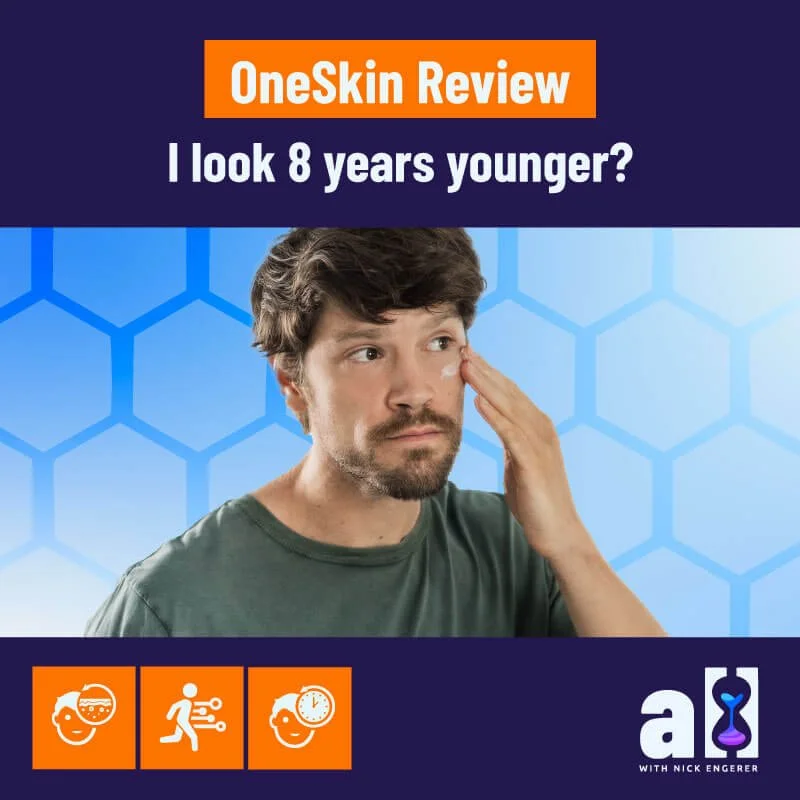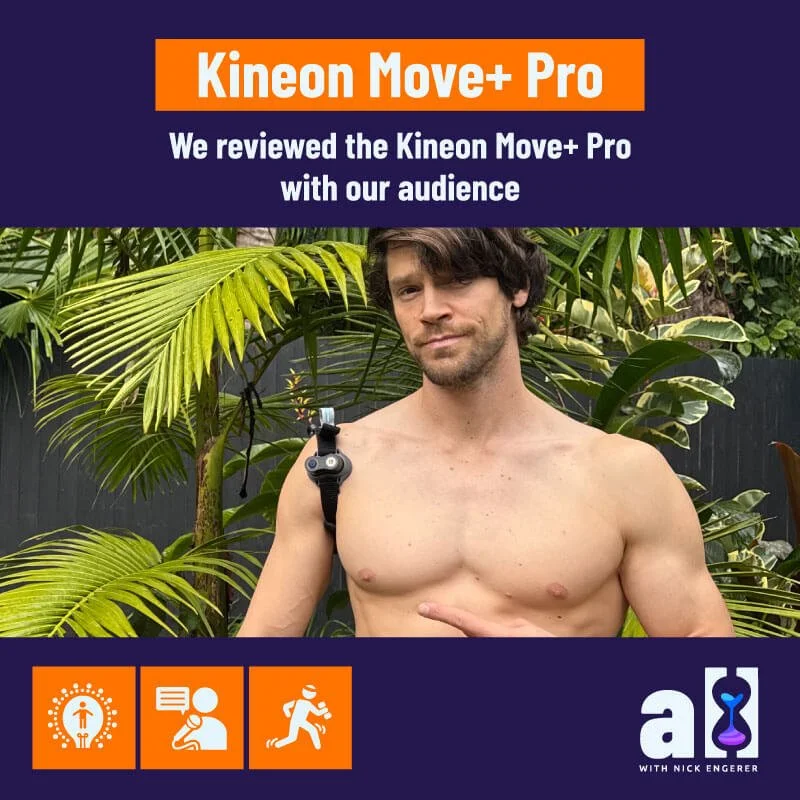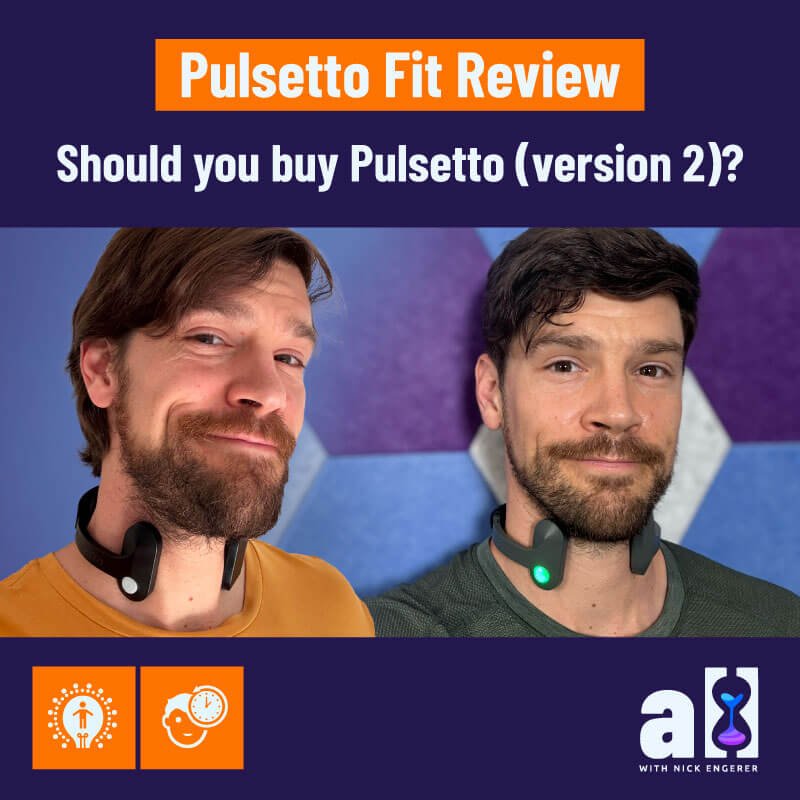Full body MRI screening technology - Interview with Health Nucleus Part 3
In this post you’ll learn about:
The power of Health Nucleus MRI algorithms (e.g. early detection of brain aneurysms or quantifying visceral fat levels)
Same examples of how multiple Health Nucleus visits enable deeper personalised analytics
How the Health Nucleus is prevention focussed, rather than on optimisation (but that’s a good thing!)
Part 3 - MRI analytics & health optimisation
Be sure to read Part 1 and Part 2!
A Longer Life (ALL):
Q: What kind of data will you be pulling out of the MRI scans? Besides the heart analysis and some of the cancer detection, which we already discussed. What will be showing up in that data and what will you use it for?
Dr Duchicela: I think primarily it’s used for detecting the big things that we don’t want to miss that we really want people to know about early on, so things like cancer or aneurysms. With the post processing that they do on it, they’re able to reconstruct vasculature and vessels to look for aneurysms, even without using contrast which i think is really neat.
And then we have these different imaging biomarkers, so for Alzheimers we do hippocampal volume assessment where we look at the volume of the hippocampus and the ventricles surrounding them, and essentially see how do you compare to a healthy peer group? Are you a little bit lower or a little bit higher in these volumes, which correlates with Alzheimer’s risk. That’s one aspect.
At left, my visceral fat levels are highlighted by Health Nucleus MRI algorithms. Visceral fat is known to increase with age, and increased levels are risk factor for many diseases.
With MRI we also get the body composition like visceral fat levels, liver fat levels, liver iron levels, and muscle composition. What we’re doing with the MRI data is essentially training algorithms to better detect the sorts of cancers that traditionally you can’t detect with a non-contrast MRI, one we are working on right now is pancreatic cancer. We’ve developed a screening tool to use in MRI for pancreatic cancer and we’re in the process of validating it which is really really exciting. But that will just add to the overall comprehensiveness of the scan and of the experience, so yeah there’s lots of different things we get from the MRi, it’s pretty amazing how much data you can get from it and how much you can start to train these algorithms.
ALL: Diving deeper into MRI analytics - I have a full body scan from May 2018, I’m soon to have another scan from January 2020, and plan to continue to do these scans every 12 to 24 months depending on my travel schedule, so you’re going to get a bit of a time series going with the data.
You’ve talked about disease risk and obviously we’ll keep assessing those things but in terms of somebody who’s trying to optimise, like myself who’s a bit of a biohacker or maybe an athlete who’s thinking about their performance and their muscle composition…
Q: What kind of optimisation intelligence could we derive from MRI data over time?
“If you come back multiple times, year to year or every two years, we can trend many things and see how you’re doing. ”
MRI analytics of muscle mass. At left, my colour coded leg muscle groups in May 2018. At right, January 2020. I added 1.3L of muscle mass during that time. Note: the pictured images are from a slightly different ‘slice’ of the data.
Dr Duchicela: I would look at the imaging biomarkers, looking at the visceral fat measurements and subcutaneous measurements that we get and quantifying and trending that. The scanner software automatically marks out where your subcutaneous fat is, where your visceral fat is, we can trend your liver fat measurements, your liver iron measurements and then obviously your muscle composition too and where you’re distributing your muscle.
If you come back multiple times, year to year or every two years, we can trend many things and see how you’re doing. Some people, even if their metrics are “within a normal range”, they want to get them better, and so when you have such an accurate test like the MRI you’re able to make that quantification, you’re able to make those comparisons versus for example other machines out there that measure your visceral fat too and kind of trend it, but really MRI is pretty darn accurate for that and one of the most accurate assessments available, so if you really want to know the numbers and get that in addition to your cancer assessment and your aneurysm assessment, I think MRI is the way to go.
ALL: That’s really spot on in terms of the answer I was looking for, one thing I’d like to prompt you on…
Q: Is there opportunity to analyse the strength or flow volumes of the heart from your MRI data?
Dr Duchicela: We can see that your ejection fraction or how much blood you’re pumping out of your heart changes over time, now the question is does that actually translate into performance increases? We don’t necessarily think so for healthy individuals, because there’s lots of other things, like how fast your heart rate is going etc. So I would say not yet, I see where you're going with the question in terms of, could it be used to measure and trend athletic performance, not only for elite athletes, but for lay people who want to really maximise their athletic performance. I don’t think we’re there yet and I don’t think that’s necessarily the overall goal of this test. I think there’s a different series of tests that probably could do better than just the MRI for athletic performance trending and monitoring.
 |
ALL: Q: Are there any unique Health Nucleus tools that could be applied to assessing athletic performance and/or optimisation?
Dr Duchicela: I think with genetics we’ll start to get more information on that. There's already genetic predispositions to things like muscle tissue fibers and that sort of thing. What I would want to do as a medical director is to try to delve more into that and gather information on athletic history and get these metrics like VO2max and mile time etc and then start to work with the genetics to see if there are any predictors where we could make some correlations. That I think would be really exciting to do at some point in the future.
“I’m really excited what we have in the pipeline with this sort of scoring ... incorporating that with the coronary calcium score and putting it together and getting a global integrated risk score”
ALL: Yeah I agree with you that it would be very exciting, and again it’s not your current focus, but I was curious to ask a few questions on the topic of optimisation, so thanks for that.
One of my big outcomes from my last visit to the Health Nucleus was a ‘prescription’ for cardio exercise and to increase my muscle mass on direct guidance from one of your doctors. I took that exceptionally seriously and have been dedicated to cardio fitness routinely since that time. So I’m really curious what you think might be evident in terms of one’s biometrics and data coming from their visit to help one measure their improvement in fitness over time.
Q: You’ve talked about MRI, and a bit about genetics, what else in there might show up in this visit compared to last time if I’ve done a good job at that cardio and exercise routine?
“ the best areas to look for changes and improvements would be in your imaging biomarkers, your core lab tests for metabolic biomarkers, lipids, a1c and fasting sugar. ”
My blood lipid panel over time; some great changes in between my first Health Nucleus visit (May 2018) and my second (January 2020).
Dr Duchicela: Yeah we’ve already mentioned the imaging biomarkers like your body composition, your liver fat level, those will definitely change with lifestyle change for sure, and then I would look at your traditional blood markers. You’ve probably already been measuring those, but making sure your [Hemoglobin] A1c is good, as well as your fasting sugars and your cholesterol numbers. In terms of trending data, that’s the kind of metabolic panel we would do. We can’t trend genetics so much, so I would say the best areas to look for changes and improvements would be in your imaging biomarkers, your core lab tests for metabolic biomarkers, lipids, a1c and fasting sugar. That’s where you’d probably best be able to see improvement and change.
ALL: Cool, thanks for diving into that. And in terms of the genomic data that we’re pulling out, Q: what information in there will be actionable for somebody who wants to optimise? There’s examples of the ways you might metabolise certain precursors to vitamins, such as not being a good converter of beta carotene to retinol in the blood or the MTHFR mutation for methylation.
“It’s probably too early to hang your hat on these variants that tell you to eat a certain food or to do something very specific in terms of lifestyle unless you have one of these obviously high risk genes”
Dr Duchicela: Yeah I think that’s kind of the challenge with the genetics, the focus of the company from what I’ve seen so far is more on the hidden health risks with these high risk cancer genes, high risk cardiovascular disease genes or neurodegenerative disease genes.
In terms of optimising genetics, from what I’ve discussed with the clinical geneticist here and the genetics team, It’s probably too early to hang your hat on these variants that tell you to eat a certain food or to do something very specific in terms of lifestyle unless you have one of these obviously high risk genes, these monogenic findings. But I think it’s an area of consumer interest, what we're hearing from a lot of people is they want more specific lifestyle modifications based solely off genomics. I think that our genetics team needs to be a little more convinced that there are really good actionable things there.
It’s also a matter of prioritisation of where we put our resources, do we want to be more of a lifestyle service versus more of a medical service that’s catering towards physicians and the medical community? I think we’ll always have tension on where the focus should be. Right now the testing is looking for high risk medical issues that we can intervene on, like is there a BRCA mutation or a gene that puts you at high risk of colon cancer?
I am curious to know and to see where the science takes us with more of these lifestyle influenced variants, but i would say for right now for our testing [optimisation] is not one of the big focuses - we really want to try to prevent disease first and build off of that and then delve more into and put more resources toward lifestyle genomics.
ALL: I think that that focus area is apparent from the way your suite of testing and reporting is arranged. In my view, everybody needs to be taking advantage of these proactive aspects of medical technology before thinking about health optimisation. You’ve got to take care of the core risk and any acute issues first, in order to maintain your wellness. So I don’t think that focus is misplaced at all. It’s intriguing to hear that your team is interested and noting increased demand for this sort of individual attention. I certainly think that that’s a growing market as well.
“what is the patient’s goal?”
Dr Duchicela: Totally. There’s a lot of companies out there that will do some direct testing and tell you exactly what to eat or avoid this food based off of you having this variant. I think we want to be a little bit more careful with that just because you really have to look at things holistically. I don’t think we really want to say - stop eating cucumbers based off your genetics, we really want to take into account what the patient’s preferences.
Like i was mentioning before with the wine example, really what is the patient’s goal, is their goal to have a super restricted diet so they can live forever, or is it to enjoy time with their family, or to be able to do a certain activity better, so I hesitate to hang everything onto genetics and dictate lifestyle just based on your genetics. We really want to develop something that's more holistic.
ALL: That’s where the physician comes into the picture - in having a relationship with them that’s ongoing and aligned with your personal goals and values. I think it’s excellent you’re even mentioning personal values and thinking about them as a physician.
One of the things I think is totally rad is that - I’m sitting here interacting with you, I’m going to be talking to a doctor and several team members on my visit next week - Q: I was curious if you could remind me of how many medical professionals will be interacting with me directly or with my data as an outcome of my Health Nucleus visit?
I’ve split this interview into FOUR parts, due to its length! Part 4 will drop next week!
Previous Posts: Part 1 - Part 2
Follow-up Posts: Part 4
Note: the Health Nucleus has recently appointed a new Medical Director - Dr. Pamila Brar. Dr. Duchicela has transitioned to a role as full-time physician at the Health Nucleus, working directly with patients to optimise their healthcare!
Follow me on Twitter for the latest #Longevity news!
I post related #Longevity content to Instagram as well, follow me @nickengerer
FDA & TGA DISCLAIMER
This information is intended for educational purposes only and is not meant to substitute for medical care or to prescribe treatment for any specific health condition. These blog posts are not intended to diagnose, treat, cure or prevent any disease, and only may become actionable through consultation with a medical professional.


